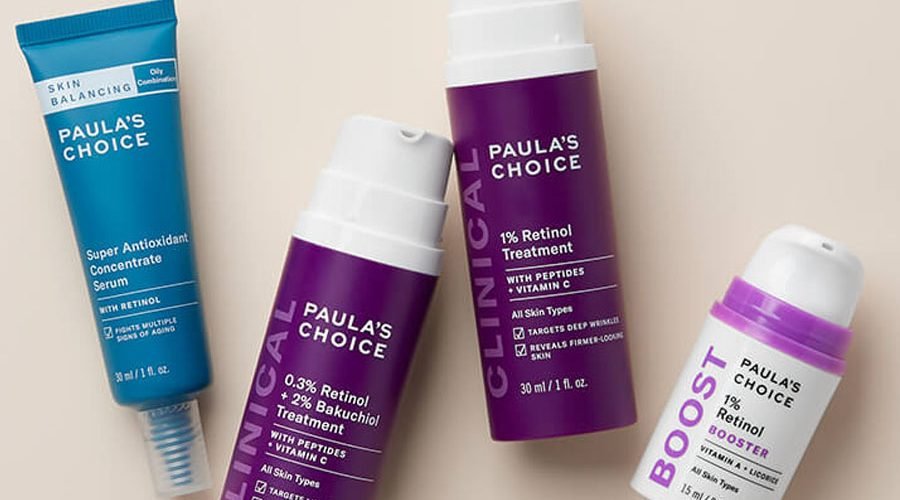“Although bakuchiol has a distinct chemical structure from retinol, it appears to act on similar cellular pathways and gene targets, leading to upregulation of collagen, for example,” says consultant dermatologist Dr. Justine Kluk.
Retinols are a preferred choice of the people to whom skincare genuinely counts. Despite that, due to skin sensitivity issues, some people might face turbulences in using it as a part of their daily skincare routine.
In scenarios as such, Bakuchiol comes to the rescue. It is a relatively gentler and skin-friendly alternative that has produced impressive results in people’s day-to-day lives.
The popularity that Bakuchiol has gained is due to its ability to fit well with any type of skin has caused its popularity to rise.
Despite their close similarities, let’s get a vivid idea about both ingredients and analyze the difference between retinol and bakuchiol.
Table of Contents
Bakuchiol Vs. Retinol : A Comparison
As far as function is concerned, both Bakuchiol and Retinol have the same role to play in a person’s skin, i.e., they help you get the dead skin cells eradicated, thus creating spaces for new cells to take their place.
Bakuchiol, derived from the seeds of the Psoralea corylifolia (babchi plant), is often referred to as a plant-based alternative to retinol. Being such allows Bakuchiol to be used in Ayurveda and Eastern Medicines for centuries. Retinol, on the other hand, is derived from Vitamin A.
It has been proven that Bakuchiol is much more gentle on the skin, allowing it to be suitable for all types of skin, including sensitive ones. Retinol tends to cause skin issues, including causing dryness, redness, peeling and burning, which is reportedly lesser when people choose Bakuchiol in their skincare routine.
Despite Bakuchiol’s gentle nature, some researches show that Bakuchiol can treat the same issues as retinol. The anti-inflammatory and anti-bacterial qualities help in shrinking the pores caused.
Retinol also tends to get degraded by exposure to the sun. That is why it is often suggested to use Retinol during nighttime to retain sensitive skin and escape sun exposure.
However, this isn’t the case with Bakuchiol, which can be used day and night and does not get degraded by exposure to the sun.
In a study, researchers found that Bakuchiol works more effectively than retinol when slowing down the activity of two matrix metalloprotease enzymes.
Thus, we could conclude that Bakuchiol has got the upper hand over the two, has versatility, and provides benefits to its users. However, you could also choose Retinol if you have tolerant and non-sensitive skin. Technically, it all depends on your choice and your skin type!
Working methods of both Retinols and Bakuchiols
· Working method of Retinols/ Retinoids
Retinoic Acid works through the definite receptors present in the cell, which help in triggering an elevation in gene expression and the increased production of collage Typ I, III, and IV.
An increase in these elements indicates your skin is firm and increases in elasticity, thus, helping you get rid of wrinkles and fine lines on your skin.
The cell turnover gets fastened up with Retinols, which helps you achieve skin with lesser hyperpigmentation and younger-looking face texture.
However, Retinoids can sometimes cause retinol dermatitis, which results in inflammation, dryness, and flaky skin. Such incidences can be prevented by using lower concentrations, slowly creating a tolerance, or using the products with as little frequency as once daily.
Also, some people can’t stand Retinoids, and they should go for its plant-based alternative, Bakuchiol.
· Working method of Bakuchiol
The Bakuchiol lacks structural similarity with the Retinoic Acid, indicating that the Bakuchiol molecule fails to fit into the Retinoic Acid receptor.
Despite the lack of resemblance, Bakuchiol has got ways to stimulate the receptor, resulting in the same effects in the case of unregulated gene expression, along with all the benefits we have discussed regarding the working of Retinols.
Synopsis of the 2018 study
In 2018, an in vivo study was published in which a comparison was drawn between a group of people who were applying Retinol to their face twice a day for 12 weeks and a group of people who had used Bakuchiol for the same duration twice a day.
This study showed no remarkable difference in the efficiency of Bakuchiol vs. Retinol. Still, a conclusion that the intensity of irritation was reported less from the Bakuchiol team was drawn.
However, a few points are mandatory to be kept in mind, which are:
- On the grounds of efficacy, bakuchiol was not found superior to Retinol but equal.
- The intensity of irritation was reported lesser in the Bakuchiol group, but it was not nil.
iii. The study was one study that was compared to hundreds of studies on the efficiency power of Retinols.
Advantages of Bakuchiol
As Bakuchiol has the upper hand over Retinol, why not sum up its benefits altogether?
· Helps in enhancing cell turnover
Increasing cell regeneration and collagen production bring in brighter and plumper skin.
· Brings down the number of fine lines on your skin
Fewer lines and fewer wrinkles can be noticed on your skin as Bakuchiol encourages collagen production, making the skin more firm.
· Makes the skin tone even
It causes a reduction in dark spots and hyperpigmentation on your skin by surfing deep down the surface of the skin.
· Aids in the curing of acne
Bakuchiol has been shown to cause a halt in the growth of P. acnes, the bacteria which ultimately causes pimples.
· Prevents dryness or irritation
Being gentler and smooth on the skin than retinol, you experience less dryness or irritation.
· Brings smoothness to the skin
The Anti-Inflammatory and Anti-Bacterial properties aid the skin in healing from acne marks, irritation, or even eczema.
Does Bakuchiol have side effects?
Bakuchiol acts as a gentler substitute to Retinol and lacks any side effects as of now. However, getting a patch test before trying a new product on your skin is always wise!
Choose the absolute best for yourself!
The detailed discussion on Bakuchiol and Retinol ultimately concludes that you know your skin best and should use healthy products.
If compared logically and based on studies, Bakuchiol is a better choice because of its multiple benefits and skin-friendliness. Still, some scientists prefer Retinols more, provided you have non-sensitive skin.
So, in the end, it’s your call! Hurry up, and get your perfect element now!





